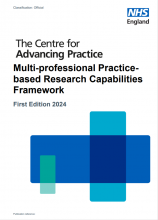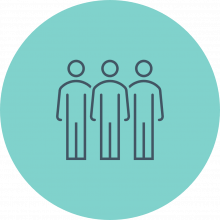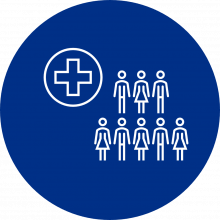Research Framework Launched

Health research is essential to improving outcomes for patients and improving the efficiency and efficacy of care. The Multi-professional Practice-based Research Capabilities Framework has been developed to clearly outline how practitioners can get involved in health and care research. In doing so, it supports changes in health and care service delivery to better meet the needs and expectations of the people and communities we serve.
The Framework breaks down the development of research-related knowledge and, skills in a way that supports practitioners to steadily develop them over time. This will allow them to not only use research, but to play a important role in delivering research and developing the evidence underpinning practice. It sets out the fundamental, or core, research capabilities expected of all practice-based health and care professionals. It supports the ambition that engaging in, and with, research becomes every health and care professional’s business, making research part of everyday practice.
The Multi-professional Practice-based Research Capabilities Framework will be a valuable tool for:

Practice-based health and care professionals
- when self-evaluating or mapping their research capabilities
- when planning professional and career development and growth, and
- to support discussions during supervision.

Service and departmental managers when:
- job planning,
- developing job descriptions,
- informing job evaluations, and
- identifying and reviewing individual objectives during professional development reviews.

Health and care organisations aiming to
- embed a culture that values engagement in, and with, research,
- set realistic expectations for research activity as part of everyday practice,
- consider the resources and infrastructure required to support practitioners to engage in, and with, research, and
- recognise and support research potential and talent.

Education and training providers when:
- benchmarking learning outcomes and content of educational provision,
- ensuring pre-registration education appropriately prepares new graduates to meet entry level expectations in the research pillar,
- planning or revising post-registration award-bearing study, and
- when designing other continuing development opportunities.
The Framework has been designed to ensure people can see all the opportunities available to them. It encourages them to learn new skills, become research aware, get involved in, and contribute to, research activity in their organisation. The Framework allows people to identify their current career framework level and the capabilities they would need to develop to move to a different role. Application of the Framework by organisations will support career development and enable the health and care sector’s greatest asset – its people – to fulfil their research potential.
Multi-professional support

Research is a team sport and the capabilities that underpin practice-based research unites professions. The Long-Term Workforce Plan signals the importance of clinical research and the work of the NIHR to open opportunity to underrepresented groups is to be applauded. It is this strength that we must urgently harness to drive practice-based research which confidently grapples with the wicked issues we face in modern health and care. Our populations need real life research to drive the fundamental shifts that will underpin and improve our approach to population health and drive down health inequalities.
Beverley Harden Allied Health Professions Lead NHS England

I am so delighted to see the launch of The Multi-professional Practice-based Research Capabilities Framework.
Dr Hazel Roddam
In recent years there has been a very clearly articulated demand for guidance to address the identified need for practitioners to be equipped with the research-related awareness, skills and confidence that will enable them to deliver the highest quality of evidence-based care.
These capabilities are essential in all health and social care work sectors, job roles and at all career stages; as explicitly framed in the Research and Innovation Strategy vision statements in our respective NMAHP publications.
The contribution of this important reference document will be to guide more transparent and consistent progression of capabilities for individuals.
It also signals a significant step towards building a more inspiring culture for the recruitment and retention of our collective workforce.

Engagement in research should be an applied component of the everyday practice of advanced practitioners across all health and care settings in alignment with the capabilities of the research pillar of advanced practice. The Multi-professional Practice-based Research Capabilities Framework enables all those practitioners working across the continuum of advancing practice to understand how to effectively engage in practice-based research for optimising patient experiences and outcomes by enabling practitioners to routinely be a part of a research culture on an integrated basis within their day-to-day working lives. The Multi-professional Practice-based Research Capabilities Framework enables all those practitioners working across the continuum of advancing practice to understand how to effectively engage in practice-based research for optimising patient experiences and outcomes by enabling practitioners to routinely be a part of a research inclusive culture on an integrated basis within their day-to-day working lives.
Julian Barratt – Centre for Advancing Practice Lead

Research is important as it underpins advances in care and is the basis for evidence-based practice. Key to having research embedded in health and care is having staff who can understand, use and generate new research. The NHS England Chief Nursing Officer’s research team were really pleased to be asked to contribute to the development of this framework. We hope all the healthcare professions, in whatever setting they work, will use this framework to enable them to enhance their research-related knowledge, skills and capabilities. We look forward to hearing how individual practitioners, team and organisations are using the framework to strengthen this pillar of practice, creating opportunities to get involved, engage with, support and undertake research.
Alison Richardson Head of Nursing Research (Academic Leadership & Strategy) & Joanne Cooper Head of Nursing Research (Research Transformation)

The involvement of health and care practitioners in, and with, research is key to transforming services to better meet the needs and expectations of those we serve. Research capabilities can be learned, developed and polished over time, and the Framework provides a stepped approach supporting practitioners to do just that. Individuals, teams, organisations and education providers can work with the Framework to make continuous, small, sustainable changes. I can’t wait to see how its use and implementation over time helps to shape cultures that value and benefit from embedding research into day-to-day practice, supporting system-wide change for the benefit of all.
Dr Jo Watson – Health and Social Care Consultant, Dr Jo Watson Consulting Ltd.

Practice-based research is critical to the development and refinement of care across the health and social care spectrum. This new framework aims to provide a structure for practice-based research from newly qualified through to consultant level practice. The framework is designed to enable and support research capabilities at each level of career progression and is written specifically to be applicable across professional backgrounds, and to be used by individuals, groups, organisations and educators. We are excited to see this framework launched and very much look forward to seeing how it will be used to support and explore practice.
Professor Joy Conway